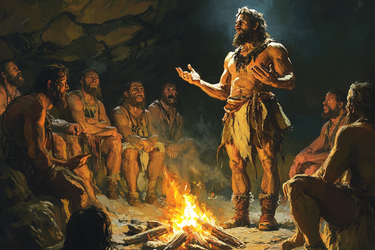Did Man Create God?
A Look at Our Search for Meaning

Long before we learned to read, write, or farm, humans were already asking big questions. One of the most ancient places on Earth—Göbekli Tepe in modern-day Turkey—stands as evidence of this. Built around 12,000 years ago, it's older than the pyramids or Stonehenge, and back then, people hadn't even figured out how to cultivate crops. And yet, they pooled their efforts to construct massive stone structures. Why? Clearly, they had something bigger on their minds. At the heart of these gatherings was the idea of worship, a connection to something larger than themselves.
The urge to ask, Why are we here? and What happens when we die? is as old as our species. These questions cross all boundaries—time, space, language, and culture. From the deepest rainforests of the Amazon, where uncontacted tribes still practice forms of spiritual worship, to the bustling cities where modern religions thrive, human beings have found meaning through stories, myths, and beliefs. That’s not unique to any one group; it’s part of being human.
If we look at ancient myths, stories of gods and divine beings, we find similar threads across many ancient cultures. In Greece, there was Zeus. In Egypt, Ra. The Norse worshiped Odin, and the Aztecs honored gods like Quetzalcoatl. And those civilizations weren’t the first. It’s likely that religion, in some form, began when early humans first asked simple but haunting questions. Maybe it started when they saw their own loved ones die for the first time. A child might have asked, “What happened to Grandma? Where did she go?” For tribal elders—leaders who needed to keep order—answers weren’t just helpful; they were necessary.
So, these stories of gods and spirits were passed down orally, long before there was writing. Picture the elders around a fire, or cavemen painting symbols on walls to depict a universe still full of mystery. It’s essential to remember that these people knew very little about how the world really worked. They didn’t have science to fall back on like we do now. The sunrise, thunderstorms, disease, and death all seemed like supernatural forces.
But when writing finally evolved—thousands of years after Göbekli Tepe—those same stories of gods, creation, and floods took on a weight they hadn’t before. They were no longer just tales to be shared around a campfire but became records, oftentimes treated as divine truth. These were the answers society organized itself around.
And then something else happened: society became more complex. Villages turned into cities, and cities needed leaders—kings, emperors, or warlords—who could maintain control over often large, growing populations. Religion, once a source of comfort or explanation, became a tool. Leaders realized that controlling what people believed could keep them loyal. Many rulers claimed to have their power directly from the gods. Some even claimed to be gods themselves. Ancient Egyptian pharaohs were worshiped as gods on Earth, and today, North Korean dictators claim supernatural origins to maintain power—all strategies to command loyalty.
And here’s the thing: once you have the power to control ideas, you have enormous influence. Some of the most terrible events in history—wars, persecutions, and oppressions—happened when religion and government went hand in hand. Powerful people exploited faith, turning it into a means of control rather than a shared human quest for meaning.
Today, we see some of the same tactics. In places like Russia, China, and North Korea, the government tells people who to blame for their problems, creating narratives that stir hate or fear toward outsiders or opponents. It’s an old technique, recycled for a modern audience.
And yes, even in the United States, we see hints of this kind of manipulation. People are swayed not by facts but by emotional appeals to faith or identity, fueling divides.
But here’s the pivotal question: Does that mean religion is to blame? Not necessarily. Faith is deeply personal, and for many, it offers peace, comfort, and community. The real issue arises when those in power use it to justify cruelty, violence, or division.
So, did man create God? Maybe we were the ones who needed to create the idea of God to navigate the mysteries of life, death, and things beyond our understanding. Maybe it gave us comfort when we didn’t have microscopes or telescopes or weather satellites to explain the forces and processes that shape our world.
But just because belief systems can be manipulated, it doesn't mean that the search for meaning isn’t genuine. Humans are wired to ask questions, to seek answers bigger than ourselves. And maybe, in this New Age of Reason, we find value in asking these questions together: What kind of future do we want? How can we honor the past without repeating its mistakes? And can we, in our shared humanity, find a better way forward?
That's the task for the New Age of Reason—not to reject belief but to be aware, thoughtful, and never let our curiosity be weaponized against us.
Find more blog posts with similar tags
 October 13, 2024 by
October 13, 2024 by